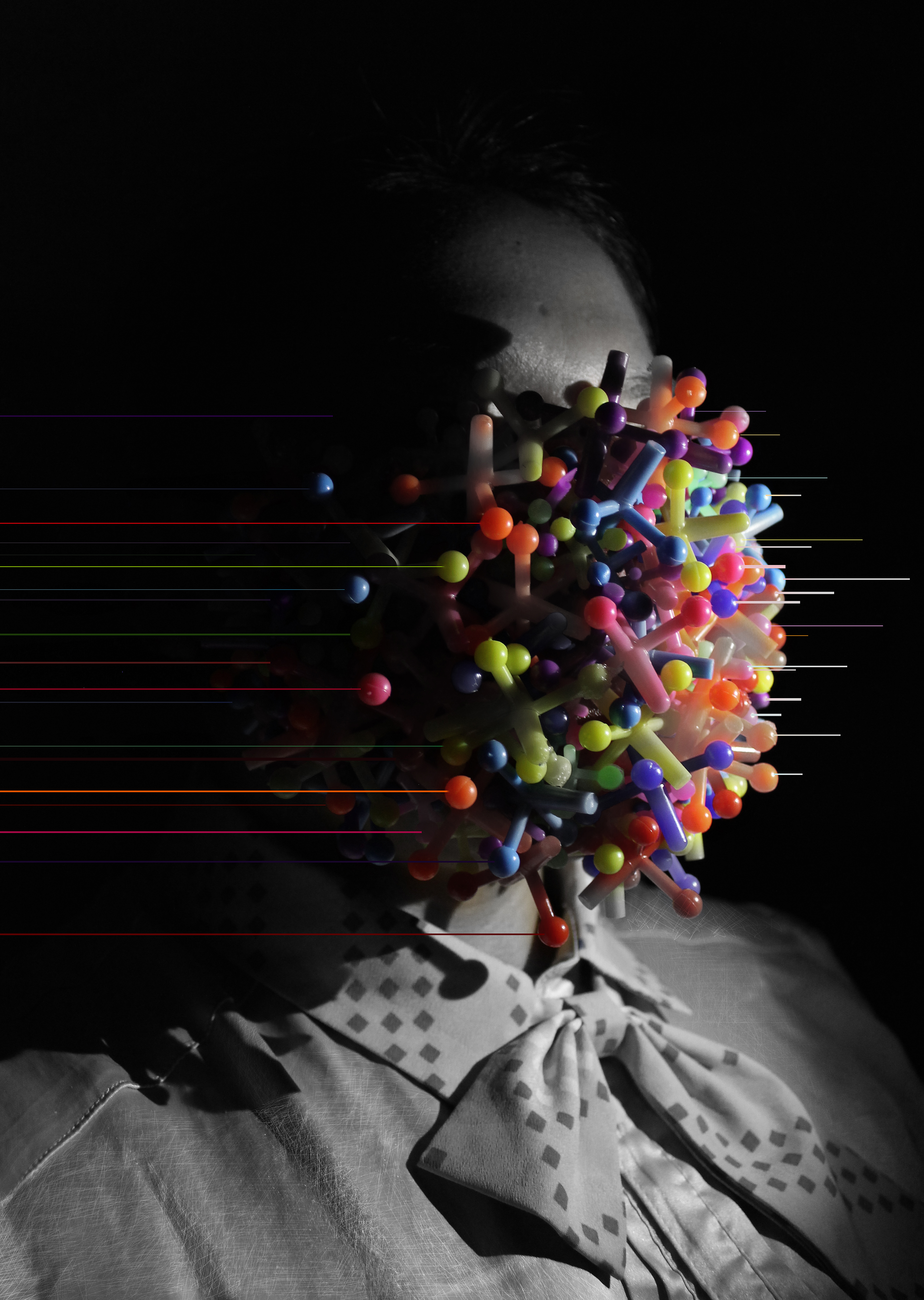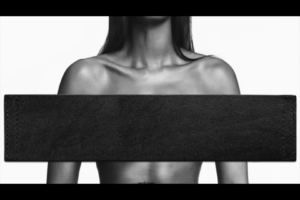Artistic practices emerge as a place of agency, a place to intervene asymmetries, to reappropriate our own corporeality’s, to decolonize identity constructions and to discover emancipated and committed aesthetics.
Elizabeth Pozo Rubio on a group show of emerging female artists
Ressurgir
An exhibition from Angola to open dialogues and explore resilient femininities
The imagination of emerging women is a creative force that the exhibition Ressurgir. Mulheres desde o Sul e cartografias de um despertar presents from Luanda, Angola. The visual arts exhibition, which opened on 31 January 2025, brings together the artistic practices of women artists from Angola, Curaçao, Chile, Peru and countries of the Global South. It brings together their diverse and powerful aesthetics to summon corporealities and affectivities and give voice to subjectivities historically relegated to invisibility. Could it be that their stories share common questions, could it be that their gestures intersect within colonial and subaltern histories?
Works in video, painting, photography and drawing are included in the exhibition. Some of them have been made in previous years and are shown for the first time in the Angolan context and Sub-Saharan Africa geography, to renew their questioning from transcultural coordinates. Other proposals have been created to be exhibited to the public for the first time. Among the aspirations that run through this mosaic of languages is the possibility of bringing gendered narratives, that is, to create poetics that explore the singularities of our visions as women. Also to elaborate a common space of imagination, where creative territories and sensorialities intersect. A place where other femininities emerge, where the artists defy the silence that crosses our social geographies.
Visuhely Americaan, Still of video Palabra ta liber di piká, 2022
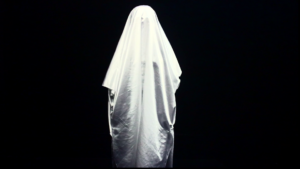
Vesuhely Americaan, Still of video Diskulpa diskulpá 2022
In the videos of Vesuhely Americaan (Curaçao), the Caribbean artist puts her own body into action. In the audiovisual Diskulpa diskulpá (2022), she appears covered with a white veil next to other male and female bodies different from hers. Throughout the film, men and women, white, mulatto, slim or muscular, have their backs to the viewer and wear only underwear or shorts. Her figure in the center, the absence of faces, focuses the viewer’s gaze on her physical presence, covered all in white. In the sequences, the air lifts the cloth that covers her and reveals her corporeality, recorded with total realism. She then dives into the water in a ritual of self-discovery and affirmation. The short film, in this way, proposes a space of reclamation where her identity is vindicated. Here her materiality emerges as a dignified place, from the video.
In another of her audiovisuals, Palabra ta liber di piká (2022), images of women from the world of women’s fashion, magazines and mass media turn the audiovisual into a critique of cultural representations. Bleached, hygienised bodies that respond to Eurocentric patterns of beauty follow one after the other during the material. The pace at which they pass conveys a sense of accumulation and asphyxiation, and also leads us to think about their devastating effects. How much they monopolize and exclude subjectivities, how much they restrict and control who we can be!
Control (2022), shows the choreographer, theorist and cultural worker Vesna Brzovic (Chile) jumping over a group of aligned logs, accompanied by a voice-over that talks about the movement. In the short film, the slow motion slows down the jump and gives it a new perceptual impact. The message conveyed by the voice is related to the loss of control. This, together with the staging of the female body bursting into the natural landscape, summons the jump as a liberating and disengaging gesture. An act through which the artist re-appropriates an unprecedented potentiality.
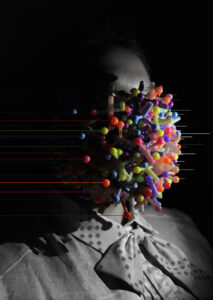
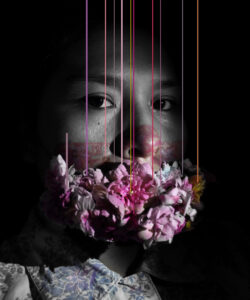
Delfina Nina, works from the series Reeencuentro, 2019-2020
From art, the creators invited to the event, elaborate their own language. They elaborate non-alienated images that express radically new and at the same time legitimate experiences. This is the case with the photographs of the artist Delfina Nina Pinchi (Peru) in the exhibition. Her portraits always reveal an unusual face.
The photos in the series Reeencuentro (2019-2020) were taken during the period of COVID. The experience of confinement, silence and isolation are translated into the sort of masks with which Delfina Nina covers her face in the self-portraits. This time the garment intended to isolate and protect the body from contact has been replaced by poetic objects. Are these materials from her everyday environment that cover her mouth like sanitary masks and sometimes even her eyes. These elements can be toys, bouquets of flowers and green leaves, their colors contrasting with the black and white image of the artist. They are attached to her body to bring about her own personal sensoriality, a new link between her and the universe around her, the emergence of her subjectivity as a difference, as a singular being.
The possibility of her own representation is also claimed through the works of Marisa Kingica (Angola): Saímos todos da mulher (2025), Assobio de liberdade (2025), Sem Título (2025). It is to this need that the artist assigns the means she uses, resorting to painting to express this discursive need. The series presented by the artist focuses on the experiences of Angolan women with shaved heads. One of the customs present in the African country is to cut women’s hair when they incur in behaviors that contravene social rules, infidelity among them. Her canvases are inspired by this punitive act, inscribed through a physical mark on the women.
The stigmatization of female identity and its effects are explored in the works, through the free and original use of canvases. In one of the works, through a treatment similar to graffiti, she gives pre-eminence to the written message, to the power of the word. There she transfers the words and expletives used to describe shaved women, therefore unfaithful and disruptive, together with female silhouettes.
Marisa Kingica’s other pieces dismantle this disciplinary fact. The author incorporates elements from her living space into the canvases, such as ropes and traditional accessories that she sews and hangs on the canvases. An aesthetic close to life, to her living space, is forged from the pieces and also a place of speech.
Other narratives about the body are contributed by the artists participating in the visual exhibition. Each proposal is always personal and free, and shows the artists in dialogue with their own living environment. The works of Laysa Marques, a young Angolan artist, are also close to the context of life. The works are made up of three drawings that highlight the spontaneity of the format to capture the dramas of daily life. With a dynamic, expressive stroke and a figuration that sometimes recalls the world of cartoons, the artist speaks in a contemporary way of the people who surround her in her daily life. Children and women who make a living from informal work are recreated in the pieces as a whole.
Marginalized and vulnerable subjects are the protagonists of the real-life scenes that the author interprets. Some of their features, eyes and hands have been enlarged compared to the other plastic motifs. The drawings incorporate texts handwritten by the author, those at the top of the pieces reflect on art as a process of capturing reality, those below give voice to the characters themselves. In this way, her works reveal a frank record of the reality that surrounds her, a way of revealing stories that are obliterated and submerged in the silence of the passing days in order to give voice to those who have none. They speak through Laysa’s drawings and from the narrative rehearsed through visuality.
Practices situated in the space of reality are presented in the exhibition Ressurgir. Mulheres desde o Sul e cartografias de um despertar. From the artistic works, the creators dismantle patterns and propose their own unique images in which they recognize themselves. Artistic practices emerge as a place of agency, a place to intervene asymmetries, to reappropriate our own corporealities, to decolonise identity constructions and to discover emancipated and committed aesthetics.
Elizabeth Pozo Rubio

